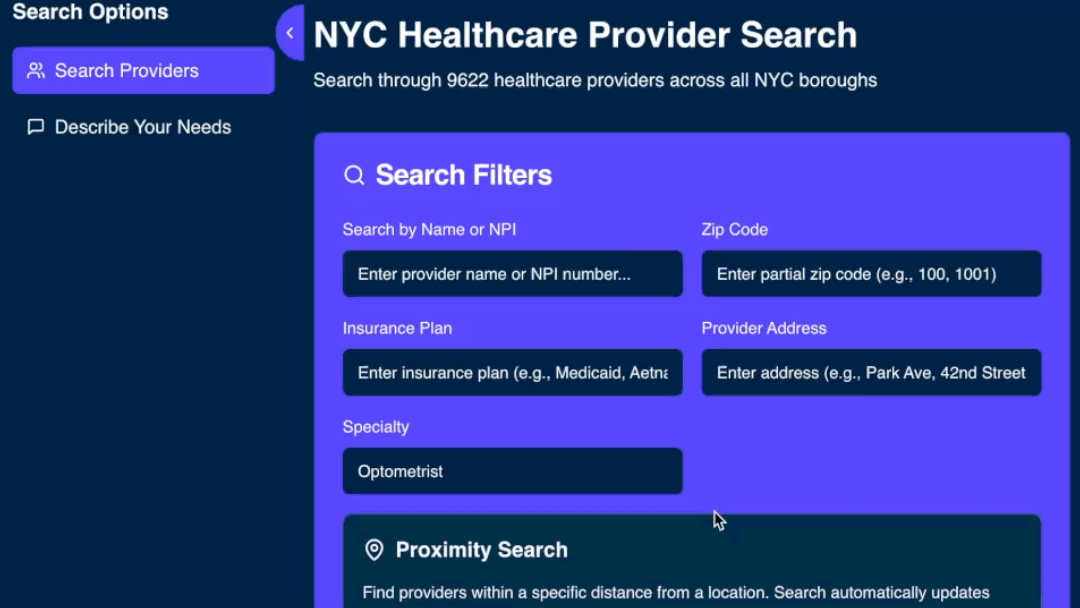OscarAI Blog
In the spirit of constantly learning, we are experimenting with several AI use cases and documenting our discoveries.
Introducing Oswell: a health AI agent for Oscar members
A new AI agent designed to make healthcare simpler, more personal, and seamlessly connected through Oscar.
Inside Oscar’s first high school immersion program: students reimagine provider search with AI
Through hands-on mentorship and workshops, four high schoolers got a front-row seat to the future of health tech.
Building a Superagent: How we’re using AI to explain healthcare, faster
How Oscar built a first-of-its-kind multi-agent system that uses GPT to answer member health questions in real time, powered by direct integration with health insurance backend systems.
Using AI to fix one of healthcare’s most overlooked bottlenecks: getting documents to the right place
Documents are the lifeblood of healthcare operations, but they can also be a real challenge to manage.
AI has changed how we understand member calls – and how we respond to them
A look at how Oscar developed an AI model to create a structured call intent taxonomy and to classify member calls, uncover pain points, and improve the member experience.
Transforming the contract auditing process with GPT
At Oscar, AI is helping unlock powerful new ways to understand and extract data from provider contracts.
Extracting data from medical records and contracts is hard. Here’s how AI is making it easier
Medical records aren’t just words—they’re images, tables, and non-standard layouts that AI models can struggle to process. That’s why multimodal models, which handle text and images together, are changing the game.
How well do digital health interventions work? A diabetes study hints at where the space is headed
Digital health interventions show promise in managing diabetes, but their high costs challenge their value, pointing to a need for more personalized and cost-effective solutions.
How Oscar is using generative AI to power personalized member outreach
With a recent initiative, Oscar is showing how AI can help personalize how we communicate with members.
Inside our Latest Hackathon
We recently wrapped up our latest Hackathon –– an event that brought together Oscar employees from various teams to brainstorm new AI use cases and explore how our tech can enhance the healthcare experience for our members, providers, and brokers.
Now is the Time to Prepare Best Practices to Use AI Responsibly to its Full Potential
Research on AI is moving unpredictably fast. Though the use of AI holds great potential in the healthcare space to improve affordability, efficiencies and even outcomes, the stakes are inherently higher in use cases that involve patient care.
Oscar Health’s early observations on OpenAI o1-preview
Yesterday, OpenAI dropped a preview of a new series of generative models focused on reasoning, dubbed “OpenAI o1.” Our initial observations are that the “o1-preview” model is more autonomous in generating a set of steps to solve a problem, more precise, and able to handle more complex tasks with higher consistency in output.
Harnessing OpenAI to Enhance the Healthcare Experience
The healthcare industry is too complex, costly, and cumbersome. Since our inception, we have been at the forefront of using innovative technologies and leveraging our tech stack to simplify the insurance process and improve member outcomes.
Our team recently worked with OpenAI on a case study analyzing Oscar's use of AI across our business — and our opportunity to improve healthcare. We found success within the following use cases…
Needle in a Haystack, Part 2: Testing GPT’s Ability to Read Clinical Guidelines
Part 2 of 3
Our providers leverage a repository of guidelines, varying by state, that outline conditions under which a service will be covered. These guidelines are specific to a member’s policy and plan type, and it can be a lot of information for providers to sift through. Our team is streamlining this process by teaching GPT to help clinicians filter through paperwork, allowing them more time to care for patients.
Needle in a Haystack: Using LLMs to Search for Answers in Medical Records
Part 1 of 3
We are constantly thinking about how to make the workflows of clinicians less tedious, so they can do what they do best: serve patients and provide care. In this next series of posts, we will share our learnings from a different application with the same goal: improving clinician workflows to deliver faster, better care for our members.
Related Condition Search
In the first step of our ‘find care’ pipeline, Oscar has an omni-search bar that’s able to distinguish between reasons for visit, providers, facilities, and drugs. The bar uses lexicographic (i.e., close in dictionary order) techniques to find autocomplete matches from each group type and a rules-based model decides which results from each group should be surfaced.
Curious Language Model Limitations
Language models are awesome and all, but my favorite research papers are those that show where they fail. It's easier to understand hard limits than soft capabilities. Here are four recent papers with good examples for the limits of current LLMs.
Why Notation Matters
A practical observation on LLMs that is both encouraging and worrisome: it is surprising how much NOTATION matters. Simply how you write something down makes it much easier or harder for a transformer to understand the actual meaning behind it. It’s a little like LLMs are able to read a quantum physics book, but only if it’s written in 18-point Comic Sans to look like a Dr. Seuss book.
Streamlining Commission Reconciliation: An AI Approach
Brokers are paid commissions by insurance carriers on a per month basis, but they must follow certain guidelines in order to be eligible, otherwise they will not be paid their commission. If a broker believes that they were incorrectly denied a commission, they can reach out to Oscar to ask for an explanation, a process we call a “commission reconciliation.”
AI Use Case: Messaging Encounter Documentation
Last year, we expanded our AI functionality to include a new use case: generating initial drafts for providers to document their secure messaging-based visits with patients.




















